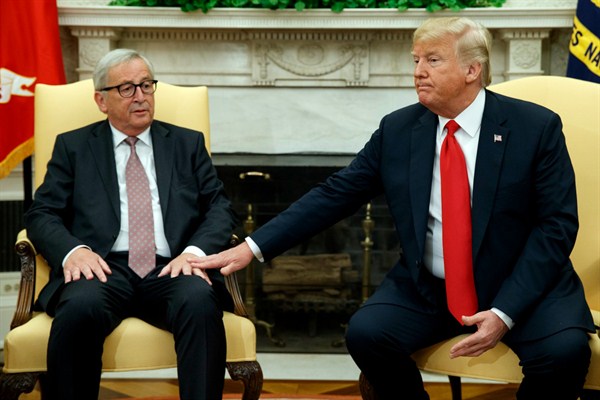While recognizing that it could be undone at any time by a single presidential tweet, there appears to be a truce on at least one front in Donald Trump’s trade war. During a visit to the White House last week, European Commission President Jean-Claude Juncker pledged along with Trump to refrain from further escalation of the trans-Atlantic trade dispute and try to work things out.
Their joint statement was vague, and the U.S. steel and aluminum tariffs on the European Union, and the EU’s retaliatory tariffs, remain in place for now. Trump imposed those duties on supposed national security grounds, invoking his authority under Section 232 of the Trade Expansion Act. A similar investigation by the Trump administration into whether imported automobiles and auto parts “threaten to impair the national security as defined in Section 232,” which could result in a tax of 25 percent on foreign cars, is still underway. Trump’s threat to impose further duties on Chinese exports remains, and the outcome of his administration’s negotiations with Canada and Mexico to update the North American Free Trade Agreement is still uncertain. This one, tentative agreement with the EU won’t nearly undo all the short- and long-term costs of Trump’s trade wars. But after the ups and downs of the past few months, I’ll take it.
The good news is that the agreement seems to head off, for now, the imposition of new retaliatory tariffs between the U.S. and the EU. The even better news is that Trump and Juncker spoke of a new phase in U.S.-EU relations, one of “close friendship, of strong trade relations in which both of us will win, of working better together for global security and prosperity, and of fighting jointly against terrorism.” That is way better than naming the EU as a foe of the U.S., as Trump did on his recent visit to Europe.

